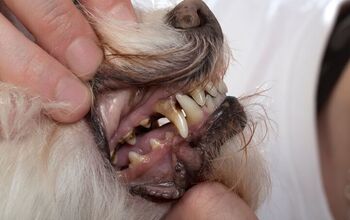5 Common Myths About Dog Aggression

All dog breeds were developed for a certain purpose, even if that purpose was simply to provide companionship. From herding and hunting to livestock guarding and companionship, dogs fulfill a wide variety of roles. Depending on the specific role for which a dog breed was developed, some breeds are naturally more protective than others and that can sometimes manifest in the form of aggression. Keep reading to learn 5 common myths about dog aggression.
The truth of the matter is that both nature and nurture play a role in determining how aggressive a dog is. Dogs developed for guarding have protective instincts that may sometimes manifest in aggressive way, but typically only in response to a threat. If a dog develops general aggressive tendencies, it is most often the result of fear or poor treatment. A dog’s reaction to fear is to go on the defensive and, sometimes, to strike before something strikes him.
Related: Dealing With A Cat-Aggressive Dog
Certain breeds of dog have a reputation for being aggressive. This is the case for Pitbulls, German Shepherds, Doberman Pinschers, and Rottweilers – dogs that are most commonly used for police work or guarding. The truth is that any dog breed can become aggressive, but these breeds gain their reputation more from the work they do than from their temperament.
The fact is that growling is simply a form of communication for dogs. A growl could certainly be a warning given prior to an attack, but it can also be playful, or it might not mean anything at all. It is naturally for a dog to grown when resolving conflict with another dog, and it doesn’t necessarily mean that a fight is imminent – it’s just a way for your dog to communicate.
Related: Dog Aggression Could Be Cured With Love Hormone
If your dog is growling, snapping, or showing other signs of aggression you might think that sending him to obedience school is the solution. The truth is, however, that even the most well-trained dogs can sometimes be aggressive. Rather than being concerned about his training, you should be concerned about why your dog is exhibiting aggressive behavior – it could be a sign that he is hurt or sick and he’s just trying to protect himself.
It is a common misconception that testosterone is the fuel behind aggression in male dogs. While male dogs are more likely to exhibit territorial or aggressive behaviors, having your dog neutered is far from a quick fix. In fact, several studies show that it has no affect at all on your dog’s behavior. Neutering your dog will, however, provide certain health benefits such as eliminating the risk for testicular cancer.
Your dog can’t actually come out and speak to you, so it is your job to interpret the behavioral cues he gives to tell what’s going on. If your dog suddenly develops aggressive behaviors, take it as a sign that something is not right and seek veterinary care to identify the trigger instead of trying to reduce the behavior itself.

Kate Barrington is the loving owner of two cats (Bagel and Munchkin) and a noisy herd of guinea pigs. Having grown up with golden retrievers, Kate has a great deal of experience with dogs but labels herself a lover of all pets. Having received a Bachelor's degree in English, Kate has combined her love for pets and her passion for writing to create her own freelance writing business, specializing in the pet niche.
More by Kate Barrington























